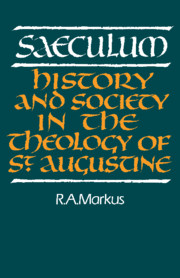Book contents
- Frontmatter
- Contents
- Introduction to the revised edition
- Preface
- Abbreviations
- 1 History: sacred and secular
- 2 Tempora Christiana: Augustine's historical experience
- 3 Civitas terrena: the secularisation of Roman history
- 4 Ordinata est res publica: the foundations of political authority
- 5 Afer scribens Afris: the Church in Augustine and the African tradition
- 6 Coge intrare: the Church and political power
- 7 Civitas peregrina: signposts
- Appendixes
- A History, prophecy and inspiration
- B De civitate Dei, XIX, 14–15 and the origins of political authority
- C Augustine and the Aristotelian revolution of the thirteenth century
- D ‘Sacred history’ and ‘salvation history’
- Bibliographical note
- List of works referred to
- Index
B - De civitate Dei, XIX, 14–15 and the origins of political authority
Published online by Cambridge University Press: 26 October 2009
- Frontmatter
- Contents
- Introduction to the revised edition
- Preface
- Abbreviations
- 1 History: sacred and secular
- 2 Tempora Christiana: Augustine's historical experience
- 3 Civitas terrena: the secularisation of Roman history
- 4 Ordinata est res publica: the foundations of political authority
- 5 Afer scribens Afris: the Church in Augustine and the African tradition
- 6 Coge intrare: the Church and political power
- 7 Civitas peregrina: signposts
- Appendixes
- A History, prophecy and inspiration
- B De civitate Dei, XIX, 14–15 and the origins of political authority
- C Augustine and the Aristotelian revolution of the thirteenth century
- D ‘Sacred history’ and ‘salvation history’
- Bibliographical note
- List of works referred to
- Index
Summary
Augustine never discusses the question of the state's origin both directly and in detail. The fullest remarks on this theme occur in these two chapters of his De dvitate Dei, and, as we shall see, even these are not wholly centred on the problem with which we are concerned. Allusions and quotations by later writers, when debating our problem, are most frequently to these two chapters. They make a suitable focal point to our enquiry.
Chapter 14 of the De dvitate Dei begins with a statement about the ends which the two ‘cities’ pursue, the main theme under discussion in Book xix. ‘In the earthly city the use of temporal things is referred to the enjoyment of earthly peace; whereas in the heavenly city it is referred to the enjoyment of eternal peace.’ Augustine now goes on to expound what the peace is which is desired by all men. As he describes it, it is identical with what he has called ‘eternal peace’; this alone ultimately satisfies all human longings. He continues with an account of how man is to conduct himself so as to attain this eternal peace. He is to obey the two chief commandments of God: to love God and to love his neighbour as himself. The latter must include having consideration for one's fellow men, encouraging them to love God, and being prepared to be thus encouraged by others.
- Type
- Chapter
- Information
- SaeculumHistory and Society in the Theology of St Augustine, pp. 197 - 210Publisher: Cambridge University PressPrint publication year: 1989

